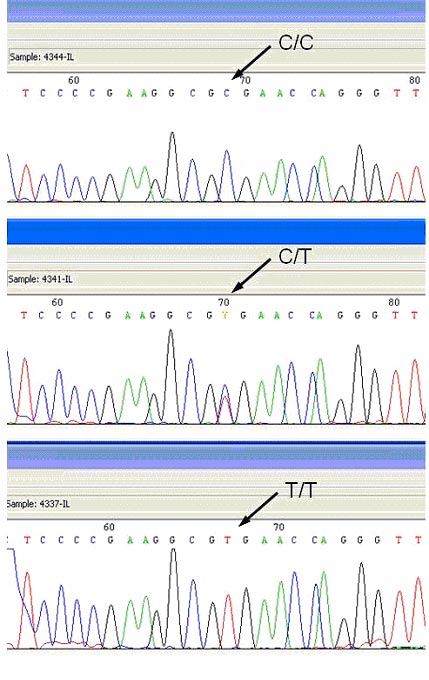Infection by the hepatitis C virus is often the cause of viral hepatitis and worldwide there are about 170 million people infected. In most patients (about 80 %) HCV infection passes into the chronic stage with the development of chronic hepatitis and approximately in a third of these patients it leads to the developement of cirrhosis and hepatocellular carcinoma. Epidemiologic, viral and host factors are associated with differences in the initial HCV "clearence" or persistence of the infection and then with the response to treatment of the HCV infection. Studies have shown that a strong immune response against HCV increases both, spontanous viral „clearence“ and also the chance of cure chronic hepatitis. Recent studies demonstrated that SNP (single nucleotide polymorphism) located 3 kilobases before the IL28B gene, which encodes interferon -λ3, is associated with a response to the treatment of HCV whilst the difference between individual genotypes is even double. Homozygote C/C has a higher frequency of "clearence" / lower frequency of persistence than homozygote T/T or heterozygote.
Examination
We detect SNP rs 12979860 of the gene IL28B by PCR and direct sequencing (see fig. 1).
References
- Ge D, Fellay J, Thompson AJ, Simon JS, Shianna KV, Urban TJ, Heinzen EL, Qiu P, Bertelsen AH, Muir AJ, Sulkowski M, McHutchison JG, Goldstein DB. Genetic variation in IL28B predicts hepatitis C treatment-induced viral clearance. Nature. 2009;461(7262):399-401.
- Thomas DL, Thio CL, Martin MP, Qi Y, Ge D, O'Huigin C, Kidd J, Kidd K, Khakoo SI, Alexander G, Goedert JJ, Kirk GD, Donfield SM, Rosen HR, Tobler LH, Busch MP, McHutchison JG, Goldstein DB, Carrington M. Genetic variation in IL28B and spontaneous clearance of hepatitis C virus. Nature. 2009;461(7265):798-801.

